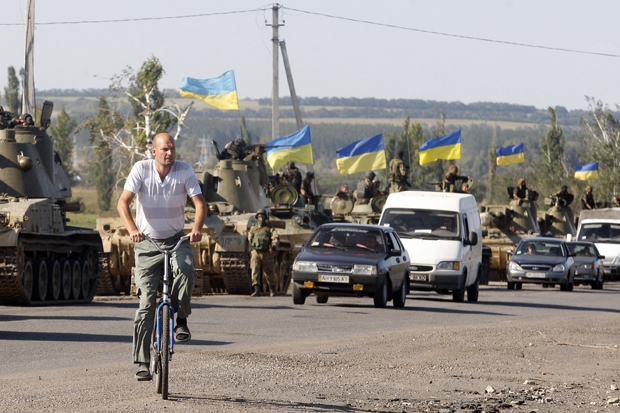This week’s Nato summit was originally intended to look back on lessons learned from Afghanistan and reflect on the notion that (as Barack Obama put it) a ‘decade of war is now ending’. How naively optimistic that seems now.
In the past week a second American journalist has been beheaded in Iraq and the Sunni insurgents who call themselves Islamic State say that a British hostage will be next. So far, their war has claimed more than 25,000 lives. Meanwhile Russia is intensifying its war with Ukraine in a conflict that has seen the loss of at least 2,000 lives.
The dignitaries who arrive in Cardiff for the summit will notice extra security because Britain’s official terror threat has been raised from ‘severe’ to ‘substantial,’ meaning that a planned attack is deemed imminent. This latest escalation is due to concerns about new Islamist camps in Kenya, not Iraq.
The vast majority of Nato members had planned (and budgeted) for a decade of peace. The alliance is still operating on assumptions agreed in 2010: that the Middle East was stable, that Iraq was healing and that the threat of a European ground war died in the last century. None of these assumptions holds now — yet for most Nato members the ability to think strategically, let alone decisively, seems to have vanished.
The last time Nato met in Britain, in July 1990, it was reborn. The Cold War had ended, but Nato would become a diplomatic force and a vehicle for various operations. But it soon had another purpose: Nato allowed European members to skimp on defence and rely on America for protection. The Pentagon now invests three times as much on defence as the rest of Nato’s member states put together. It has become less an alliance, more a military welfare state.
It is far from clear why the American taxpayer should pay to protect a rich continent that refuses to defend itself properly. The former US defence secretary Robert Gates warned in 2011 that Europe’s refusal to spend enough money on defence risked leaving the alliance with ‘a dim and dismal future’. This trend has long been clear in eastern Europe: five years ago the former Czech and Polish presidents Vaclav Havel and Lech Walesa declared in a joint protest that ‘Nato today seems weaker than when we joined’. Without American commitment, they feared, who would keep Russia at bay? Their fears have proved well founded.
Nato is still theoretically bound by Article 5 of the Treaty of Washington, which promises that an attack on one member will be regarded as an attack on all. But would Nato really have the infrastructure to repel a Putin adventure in the Baltic states like that which he has already undertaken in Ukraine? There has been nothing that even nearly replicates the forces which were stationed in West Germany during the Cold War. No new bases were built and no extra troops were deployed. Turkey is already losing faith in the alliance, as it demonstrated when it purchased a $3 billion Chinese anti-missile defence system that could not be integrated with Nato air defence systems.
Ever since the end of the Cold War, western military strategy has been to disregard Russia as a potential threat. Russia is a democracy, ran the thinking, therefore it would not menace other democracies. The same blind faith that countries cease to be a threat the moment they become democracies has coloured western military intervention in the Middle East. For 20 years policy has revolved around the idea that all we need to do is to overthrow dictatorships and instigate elections and thereafter, barring a little clearing up, once-threatening countries will become peaceful ones. It is a faith which has been utterly shattered in Afghanistan, in Libya and even more spectacularly in Iraq. Such is the march of Islamic fundamentalism that if you remove a dictatorship in the Arab world and you don’t end up with a western-style liberal democracy, you end up with a snake pit of competing religious factions, the most malign of which tends to dominate.
David Cameron failed to grasp this point a year ago when he proposed to intervene on behalf of the rebels fighting the Assad regime but was frustrated by a parliamentary vote. His critics have been proved right: how would it have helped Britain to have encouraged Isis? His reluctance to support Obama in air strikes on Isis’s Iraqi flank is difficult to understand. Unlike Assad, Isis is a direct threat to Britain, sucking in British wannabe jihadists, training them up in a moral vacuum of murderous ideology and then sending them back to wage terror here. It is unfortunate to have to choose between a ruthless suit-wearing dictator and bands of vicious religious zealots. But David Cameron — and all Nato leaders — could make their foreign policy decisions a little easier by always favouring the action that reduces the threat to western territories.
Robin Cook used to like to describe his foreign policy as ‘enlightened self-interest’. It is a doctrine which has continued to dominate, but if the past 15 years have taught us anything it is that defence policy could do with a little less enlightenment and a little more self-interest. This week’s summit provides another clear opportunity to redefine Nato’s purpose.






Comments